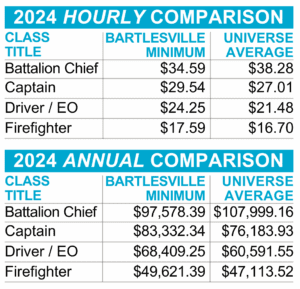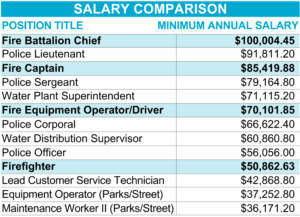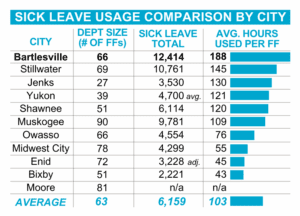City stands firm on need to promote most qualified candidates
 City Manager Mike Bailey is speaking out after a press release was issued by the City’s fire union and a social media campaign surfaced this week accusing City administration of lying about the City’s relationship with its firefighters.
City Manager Mike Bailey is speaking out after a press release was issued by the City’s fire union and a social media campaign surfaced this week accusing City administration of lying about the City’s relationship with its firefighters.
Negotiations between the City of Bartlesville and the International Association of Fire Fighters (IAFF) remain open but have so far failed to produce an agreement for a 2025-26 Fiscal Year contract. City Attorney Jess Kane updated the City Council last week on the issues, and reports have appeared in the last two editions of City Beat.
This week, the IAFF issued a press release refuting some of the information presented, but the release indicates the two sides are really not that far apart, Bailey said.
“From our perspective, this is the most information that we’ve received from the union since negotiations began,” Bailey said. “Aside from a few misleading and some blatantly false statements, the press release indicates the fire union is in agreement with us on most of the key issues.”
The City is required by law to negotiate with bargaining agents representing Bartlesville firefighters (the IAFF) and police officers (the Fraternal Order of Police) for an annual contract. Negotiations for this year began in April, and an agreement was quickly reached with the FOP. As has often been the case, however, talks with the IAFF have been prolonged and so far have not produced an agreement.
“It is unfortunate that rather than negotiating on the issues, the IAFF has chosen to mislead the public by blaming ‘the City’ for the issues we find ourselves divided on concerning the 2025-26 Fiscal Year contract,” Bailey said. “In reality, we’ve heard from many firefighters who are not in agreement with the IAFF’s position and, indeed, have not even heard what the issues truly are from their union.
“The unfortunate truth is, a small number of high-earning, senior members of the department, some of whom serve as negotiators for the IAFF, are benefitting the most from the department’s broken promotional process and overtime policies. The current system is unfair and does not provide adequate opportunity for most of the employees of the department, and it is administration’s duty to ensure that this changes.”
If the sides ultimately fail to come to an agreement, the matter will move to arbitration and could require an election for Bartlesville voters to decide the issues. Bailey says City negotiators remain optimistic it won’t come to that.
“We are hopeful — and will remain hopeful up until the last possible moment — that we will be able to reach an agreement and that arbitration, let alone an election, will not be necessary,” he said. “We understand the inherent adversarial nature of this process, but I want to make it very clear that we — and I mean all of us, including the City Council, staff and members of our community — value our Fire Department and every single firefighter who has chosen to work here. None of us want to pursue adversarial processes that further divide us and could require citizens to decide these issues.
“I want to stress, however, that we also feel very strongly that the best, most qualified people should be the ones who are promoted into leadership positions and not the ones who have simply been here the longest. Additionally, it would be wrong for us to just ignore abuses in the sick and family (sick) leave that is costing taxpayers hundreds of thousands of dollars every year.
“I feel pretty confident in saying the majority of our firefighters and the citizens of Bartlesville would agree on both counts, and I sincerely hope the IAFF will come to the table and help find solutions to these issues so we can move forward with presenting a 2025-26 FY contract to the City Council for approval.”
For more information, see Q&A below. See the current contract Contract COB IAFF FY 2024-25. To see the City’s most recent offer to the IAFF, to which no response has been received, see City’s Proposed 2025-2026 IAFF CBA – 9-26-25.
Your Questions
City Manager Mike Bailey addresses questions about ongoing negotiations between the City of Bartlesville and the International Association of Fire Fighters in today’s Your Questions. (This article was also published in the October 17 edition of CityBeat, the City’s free, weekly e-newsletter. Your Questions is a feature in the newsletter.)
The Issues: No agreement so far
What is the City proposing as part of negotiations with the IAFF?
The City has offered to provide a 5 percent raise and has requested reforms to the promotional process and to address high costs associated with double time pay.
- The 5 percent raise matches increases granted to all other city employees.
- The request for reforms to the promotional process is intended to ensure that the most qualified employees are promoted into leadership, not simply because someone has worked for the City the longest.
- The concerns about higher-than-expected double time cost are exacerbated by excessive use of sick leave. When a firefighter calls in sick, the City is required to call in another firefighter, often a more senior, higher-earning firefighter, in what is called a “hire back” situation. That employee is then paid double time for those hours, which can be as high as four to five times as much as the assigned firefighter would have made.
The pay: Setting the record straight

This chart shows Bartlesville firefighter pay scales compared to other cities in our “universe,” which consists of the five cities above and the five cities below us in population. Note these comparisons are based on 2024 wages because 2025 contracts for several of the required cities were not available at the time the comparison was made.
Some people on social media are saying the City is refusing to pay firefighters a fair wage. How much do our firefighters make versus other fire departments of similar size?
The following chart (right) shows our firefighters’ wages compared to our peer cities. These cities are the closest to us in population. As you can see, our firefighters are very well paid. And we are proud of this fact. We want to attract the best emergency responders, so we have to pay as well as is financially prudent for a city of our size.
How much do our firefighters make versus other City of Bartlesville employees?
Again, very well. The City of Bartlesville’s pay ranges are varied based on skill, requirements, complexity of job, and oversight responsibilities. However, as shown in the chart below, our firefighters are very fairly compensated when compared to the rest of the organization. In fact, of the City’s 50 highest-earning positions, 22 are firefighters.

This chart shows firefighter and comparable positions within the City, if the City’s proposed offer to the IAFF is approved. These numbers reflect increases given to all City employees in FY 2025-26 and what firefighter increases would be if the offer is accepted.
Promotional Process: Why it’s important
What’s wrong with the current promotion system? If someone has been there longer, don’t they deserve the promotion?
Our current promotional system is designed to incentivize longevity and not performance. Regardless of training, performance, education, and prior experience, our system will always promote the most senior firefighter if they meet minimum qualifications.
We are one of only two fire departments of our size who promote in this manner, and the fire department is the only department in the City of Bartlesville that does not promote based on performance. I am aware of no other company, government, or agency in our city that uses seniority as the most important factor in promotion. I also do not know of any high performing organizations that promote in this manner. There is a reason that successful organizations reward longevity but promote excellence. We want to do the same.
Won’t a performance-based promotional system allow for bias and favoritism?
This is a favorite argument of the IAFF, but the short answer is, no. A performance-based system will incorporate much of the same testing and evaluation as what is currently used for promotions. However, a performance-based system would give weight to performance, skills, training, attendance, and other valuable leadership traits. We value these attributes as well as seniority, but in our department currently, seniority is the primary determinant of promotion.
The IAFF is well aware that the current system permits senior members to block more qualified junior members from promotional opportunities. This manipulation has happened in the past. The argument that our proposed performance-based system allows for more manipulation is a false narrative that is contradicted by actual facts.
Additionally, ignoring performance in promotions creates a culture where the best younger employees will leave for departments with better promotional systems. We know that this has happened before, and it will almost certainly keep happening unless we change the system.
Worth noting is that we currently promote battalion chief positions by using a competitive performance-based promotional system. The changes we’re proposing to this year’s contract are mirrored off a system that we currently use, with only a few minor changes. The battalion chief promotional system was agreed to by the City and the IAFF.
Wouldn’t a performance-based system allow for inexperienced and unqualified promotions?
No. A firefighter would still have to meet minimum qualifications, including training and experience, to be considered. This would not change. Under the City’s proposal, only the top five most senior people in each rank would be able to test for promotion, so seniority would still be a huge factor in the promotional process. Additionally, performance-based promotional systems would encourage firefighters to perform at a higher level, which raises the performance of the entire department.
In fact, our current system has a much greater potential to promote under qualified people than our proposed promotional system.
Sick leave and double time: How the 2 are related
Firefighters are guaranteed overtime two of three pay periods for which they are paid at a rate of time and a half. They are paid double time, or twice their regular rate of pay, for “force-back” time, which is time that is unscheduled. Force-back time is most commonly used when a firefighter unexpectedly uses sick leave and another firefighter must work the shift for the department to meet minimum manning requirements.
What is a firefighter’s normal schedule?
Our firefighters work one 24-hour shift and then have 48 hours off before their next 24-hour shift. In essence, they are scheduled to work one out of every three days.
You claim that our fire department has excessive sick leave use that contributes to the double time pay expense. What are the numbers?
 Our department is averaging 12,374 hours per year for the last six years. Our department has used between 10,879 to 13,529 over this six-year span, so the average is a fair representation.
Our department is averaging 12,374 hours per year for the last six years. Our department has used between 10,879 to 13,529 over this six-year span, so the average is a fair representation.
In further analysis, our department used 188 hours per employee last year, which represents almost eight shifts or almost one month of sick leave per employee. This is by far the highest of any similar sized department. Bixby is at the low end averaging 43 hours per employee, with Stillwater closest to us at 145 hours per employee.
The average of all departments of similar size was 103 hours per employee. This means we are 437 percent worse than Bixby, 55 percent worse than the average, and 30 percent worse than Stillwater, which was the only department close to us. Each of these hours of sick leave likely results in a hire back situation where another firefighter must be called in and paid double time at the tax payers expense.
To be clear, overtime does not occur every time someone calls in sick. Sick leave is the main driver of overtime, but it is also affected by injury leave, including worker’s compensation cases, funeral leave, and military leave.
Are the City of Bartlesville’s sick leave numbers reported for the fire department inflated because of family sick and catastrophic leave?
No. The City of Bartlesville’s sick leave numbers are being compared fairly to other fire departments. These numbers are based on how much sick leave was used and not on what was granted. This usage was then compared to how much was used by similar sized departments.
The IAFF states that, “Scheduled overtime is lost if a firefighter calls in sick.” If this is true, then why would anyone risk abusing sick leave and losing overtime pay?
This statement is partially true. Sick leave is not counted as hours worked for overtime calculations, so if a firefighter calls in personal sick leave on a pay period where they are scheduled to receive overtime, they will lose it. However, this only tells part of the story.
As described above, firefighters are only scheduled to receive overtime in two out of three pay periods. If a firefighter calls in sick during their “short” pay period, it does not cost them overtime.
Additionally, the City provides 72 hours of family (sick) leave that can be used to take care of a family member who is ill. Family leave time is counted as hours worked, so a firefighter would not lose overtime.
The IAFF claims that, “There were also two firefighters who were on extended sick leave approved by the Fire Chief which accounts for at least 2,000 hours of sick leave usage last year. If family leave is removed and the approved hours used by two firefighters are considered, Bartlesville is well within the peer average.” Is this true?
This might be true if you assumed that these other fire departments didn’t also have extended illnesses. As these departments all operate in a similar manner with similar risks, that is unlikely. The reality is that for six years our department has used more sick leave per firefighter than any department of our size. This is not an anomaly but a trend.
As stated above, these long-term trends of excessive use combined with patterns of sick leave being used more when its most advantageous to the firefighter, are the reasons we are seeking to reforms.
The IAFF claims that the City of Bartlesville “fail(s) to acknowledge that overtime is a direct consequence of the city’s own staffing requirements — not the result of firefighter choices. Firefighters are not guaranteed overtime, contrary to the city’s claims.” Is this true? And if it is, are you misleading the public?
This statement is confusing and, as written, it is false. All of the facts provided by the City are 100 percent true and can be supported by statistics from our own operations and other departments. We do not engage in misleading statements, so any accusations by the IAFF that the City is deceiving the public or our firefighters are patently false. To demonstrate, this statement by the IAFF is misleading and false because all firefighters are “guaranteed overtime” in two out of three pay periods. This is a verifiable fact written in the IAFF’s contract.
Is it true that firefighters can pay someone directly to work for them without fire administration’s permission instead of using their time off?
Yes. This has been a concern of management for many years, as it allows abuse of the system that is difficult to detect. Additionally, this can cause firefighters to miss vital training opportunities. Trainings are scheduled to be convenient to the firefighters based on when they are on shift, so unreported absences can cause us to be less effective and less safe as a department.
Why is double time pay a problem for the Fire Department when the Police Department receives the same benefit?
This is a classic apples and oranges comparison. We implemented double time pay for hire back in the police department to address a specific problem. The police department used a hire back sign-up sheet to solicit volunteers for hire back, and anyone who signed up received standby pay. This system resulted in a low availability of volunteers when it was most needed, and a surplus of volunteers when they were not needed.
Ultimately, we eliminated the pay for signing up, and increased the pay for actually working hire back. This saved the City of Bartlesville money and addressed the issue with hire back volunteers. This is a fantastic example of how the City of Bartlesville and a union can work together to solve a problem for the betterment of the employees and the citizens. Unfortunately, implementation of double time in the Fire Department has yielded a different result that has cost the taxpayers money without significant improvement to the problem it was intended to address.
Why don’t firefighters get paid overtime at 40 hours like other employees?
Federal law dictates this. The Fair Labor Standards Act provides that firefighters shall be paid overtime at time and a half for hours that exceed 106 in a two week pay period. The FLSA recognized the unusual shifts of first responders, understood that first responders can have significant periods of downtime while on-shift, and did not want to create an undue burden on taxpayers who fund these services.
Did the amounts calculated for the cost of double time pay include regular overtime pay received by firefighters?
No. Standard overtime was not included. As discussed above, firefighters earn overtime on all hours worked in excess of 106 hours in a two-week period. These regularly scheduled amounts were not included in calculating the cost for double time.
Other issues: Uniform allowance, retention & budget
The union is asking for an increase in clothing allowance as well, proposing to increase its current allowance of $775 to $1,200 — an amount well over allowances provided by peer cities, City officials say.
How does our uniform allowance compare to other similar sized fire departments?
We have the highest uniform allowance of any similar sized fire department. In addition, some of these peer departments only provide reimbursement for actual expenses. The City of Bartlesville provides the uniform allowance as additional compensation, and we do not require documentation of how it was spent.
Why do police officers get so much more in uniform allowance than firefighters?
Just as the agreement with our firefighters addresses situations unique to the Fire Department, our agreement with the Police Department addresses unique circumstances. As with the question of double time in the two agreements above, this is an apples and oranges comparison. Police officers are required to purchase much of their own equipment, including their “gun belt, handcuff case, silent key strap, double-ring flashlight holder, belt keeper, defense spray holder, asp holder and other police-related items,” per their contract. Additionally, police officers are required to have a cell phone for City use when they are on duty. All of this is only partially covered by the equipment allowance in their contract.
Isn’t the City of Bartlesville losing firefighters to other cities because you don’t pay enough?
No. In recent history, we have only lost two firefighters to anything other than retirement. One of these left for a different profession to better accommodate his family. The other left for the City of Tulsa and took a pay cut. In the second example, the firefighter valued a fair promotional system that would allow him to advance according to his performance enough to leave our department for less pay. These are exactly the sort of firefighters that we want to retain by reforming our promotional system.
Why are you cutting the fire department’s budget?
We’re not. There have been no cuts to the fire department’s budget in many years, and firefighters have received raises in each of the last seven years. In fact, they received increases of 8.65 percent in Fiscal Year 2025, 8.65 percent in FY 2024, 7.63 percent in FY 2023, and 14.8 percent in FY 2022. These raises have ensured that we stayed one of the highest paying departments of our size.
What has the IAFF offered in negotiations?
The IAFF has rejected all of the City of Bartlesville’s offers, and thus far, they have primarily negotiated on wages and clothing allowance. Their original request was for a 10 percent raise and a 35 percent increase to their uniform allowance. The request for the raise was subsequently lowered to 6.5 percent, which is still 30 percent more than any other city employee, including police officers.
Odds & Ends
Why is the City of Bartlesville talking about negotiations openly now when you haven’t in the past?
Unfortunately, the situation changes when we face arbitration. The negotiation process is defined in State law. Our preference is to negotiate quietly until we reach agreement, but, unfortunately, when agreement cannot be reached, arbitration is required. For arbitration to occur, public action is required by the City Council, so a public discussion has to occur. Ultimately, the voters of the City of Bartlesville may be asked to decide this matter at the polls, so it is also necessary to ensure that the public is informed about all aspects of the contract.
Why didn’t the City of Bartlesville pay for the damage to the firefighter’s vehicle caused by a City of Bartlesville dumpster during the tornado?
The City of Bartlesville did not make that decision. Like most organizations and individuals, the City of Bartlesville has an insurance provider. The insurance provider denied the firefighter’s claim because they did not believe that the City of Bartlesville was liable. Specifically, they determined that the firefighter was parked in a no-parking zone and the dumpster was blown by a tornado (act of God). The firefighter then availed himself of the legal system and filed for small claims at district court. The district court judge heard the arguments and agreed with the insurance’s denial. The judge ruled on behalf of the City of Bartlesville.
Boiled down: Promotions direct future course of Fire Department
Can you explain this situation in one paragraph?
Probably not, but here goes! The City of Bartlesville is committed to attracting and retaining top talent to serve our citizens, which is why we ensure our compensation remains highly competitive. Our firefighters are among the best paid in our peer group, and we take equal pride in the high level of service we provide to the community. Achieving that standard requires policies and procedures that promote merit, reward performance, and ensure accountability. Unfortunately, the current contract with the IAFF runs counter to these values by emphasizing longevity and rewarding absenteeism. The City’s proposal provides compensation that reflects our expectations of excellence, addresses structural weaknesses within our department, and ensures we continue delivering the best service possible to our citizens. We believe this approach will benefit our community, the department, and our firefighters — today and for years to come.
For more information, see:
Contract COB IAFF FY 2024-25
City’s Proposed 2025-2026 IAFF CBA – 9-26-25
